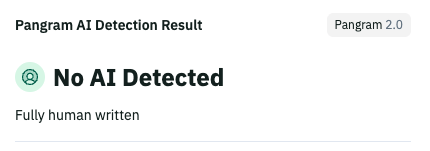Em-dash got me f*ed up

look what they did
The em-dash was my favorite punctuation.
Really: I f*ing love(d) this thing—look through any of my previous blog posts (way before LLMs) and it's littered with em-dashes.
"What a weirdo, dude is passionate about a punctuation lol"
Allow me to explain...
English is my second language; I started learning it when I moved to the States at 8 years old. While I've been working primarily in English for over 20 years now, my thoughts still tend to follow a Korean pattern (more on that later). And for years as I was learning this foreign language—I found English to be oddly restrictive. That is—until my encounter with the em-dash in middle school. Indeed, the em-dash was a punctuation that gave me permission to write English like I thought in Korean.
The Korean language is what I call a "punch-line" language. While English typically follows the structure "subject, verb, noun", Korean is usually "subject, noun, verb". And specifically when speaking Korean—because the verb comes at the end, there is always a subtle crescendo and build-up with every sentence; you can't immediately guess what the person will say until the last word has been spoken.
Interestingly—because of this structure, spoken Korean ends up lending itself naturally to gentle pauses and "drags" of the last syllable of the previous word. They're maybe most akin to "ums" and "ahs" in English, but they act fundamentally differently: these pauses and drags end up adding emotion, character, and suspense. The language sings. It flows effortlessly with a rhythm... that is also perhaps unique to each individual speaker.
Here’s the thing: the em-dash does this (tho partially) in English writing! The pauses give additional shape—it brings the reader closer to the clock-speed of the author; it adds a dimension of empathy that cannot be purely captured with words... Plus, the em-dash punctuation is self-fulfilling: the long dash gives a short respite to the eyes—and for a moment, you take a short breath in, awaiting the next sentence.
And so I'm upset.
Upset that I can no longer can use it in my emails, slack messages, and writings without pause, because it may immediately be glossed as unoriginal and slop...
Upset that it's become villinaized in the eyes of the reader...
Upset that the punctuation that brought me so much joy in both reading and writing over the years may never be seen purely going forward...
Alas, the price we pay for cheap, metered intelligence.
...
Oh and: 